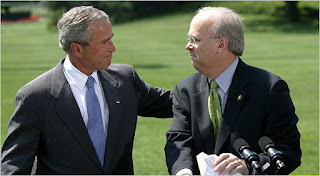
The fact is that Karl Rove, the President's Deputy White House Chief-of-Staff and closest confidant, has become a symbol of all that is wrong in Washington, D.C. for many of us. He has remained so hidden through so much of it that we have never been able to exactly pin down where his mark was. For a long while, it seemed that his specialty was domestic politics, while Cheney and Rumsfeld were the driving forces toward war. Given the President's inability to express himself clearly, leading to strong suspicions that he cannot think very clearly, it has remained doubtful that he has been the architect behind anything at all.
But be that has it may, the topic is Rove for now, as he has announced his retirement while under attack by Congress for his role in the firing of US Attorneys for political reasons.
Charlie Rose interviewed a panel on Monday about Rove, and some interesting points came out. Rove's strong-point, love him or hate him, was his ability to get Bush elected to the Texas governorship, and to the Presidency... twice. It was pointed out that he managed two very different campaigns for the victories in 2000 and 2004. In 2000, the campaign was about moderation, bi-partisanship, and compassionate conservativism. I have to admit that, feeling uneasy about what I perceived as an identity-crisis in Gore, I fell for this campaign that aimed for the middle-of-the-road voter... copying Clinton's successful approach to the White House. By 2004, however, Bush was the war president, and appealed to the Republican base, and some us believe, its basest instincts. The campaign to re-elect focused on drumming up fears about the war, terrorism, abortion, and gay rights. Bush had completely lost me by then.
This was not the first 'switcheroony' that Rove had managed to pull. Paul Burka of the Texas Monthly pointed out that Rove fought off the Christian right on his way to winning the Texas governorship. But in Washington, he became their "best friend."
Mark Halperin of Time Magazine suggested that it seems that Rove was the wrong man in the wrong place at the wrong time. He was far too partisan at a time when America was sick and tired of partisanship.
Burka admitted that it may have been a mistake on Bush's part to make his chief political advisor his chief policy man in Washington once he was elected.
The panel suspects that Rove's intention is to get the first book about the Bush presidency out so that he can resurrect the Bush image. Rove's legacy depends ultimately on what people think of Bush. And right now, the impression is not good, obviously.
Halperin thought that the Bush administration had had an opportunity to do good things on immigration reform and social security reform, both of which were supposed to be approached in a bipartisan way. But Rove's approach angered the Republican base on immigration, and efforts to privatize social security angered nearly everyone in the end.
No comments:
Post a Comment